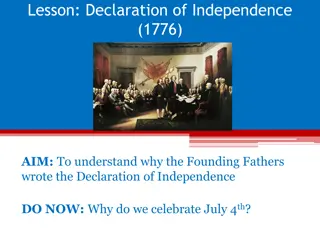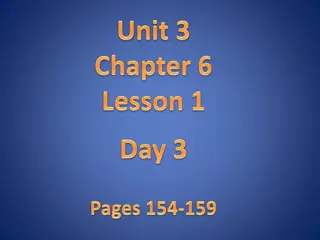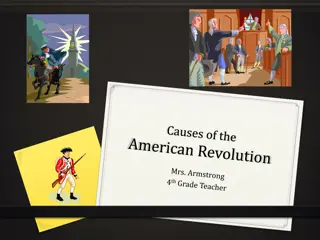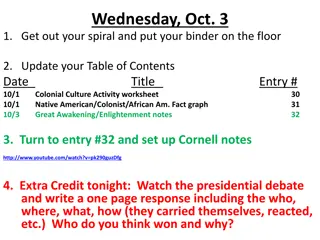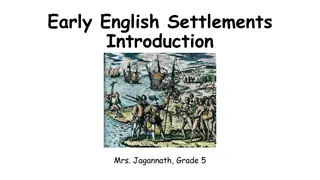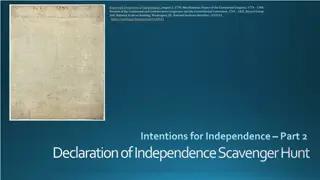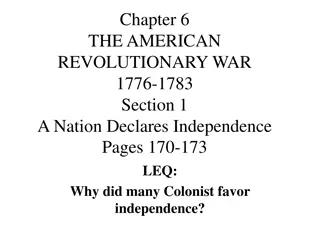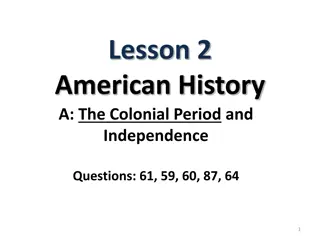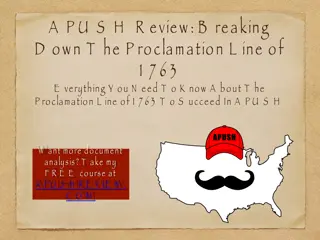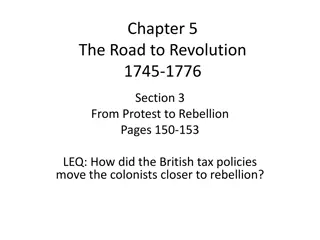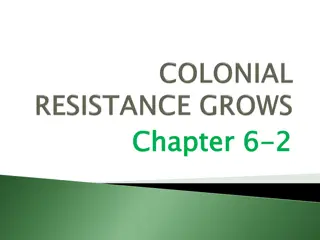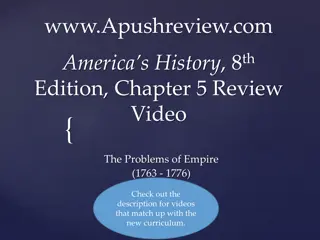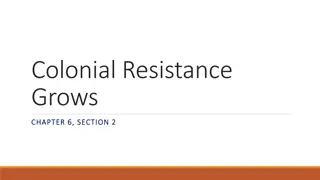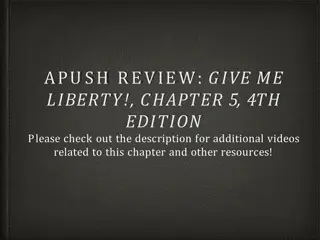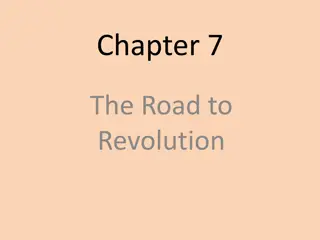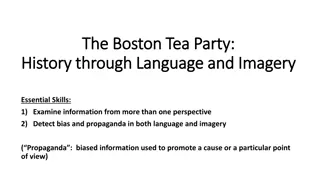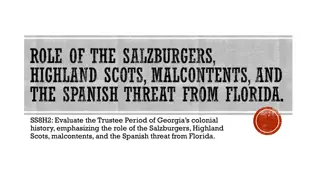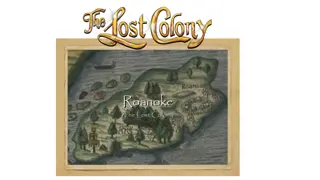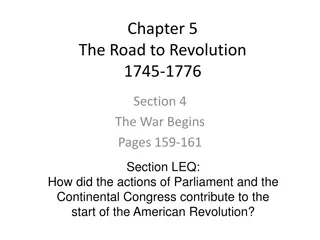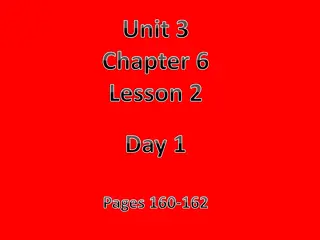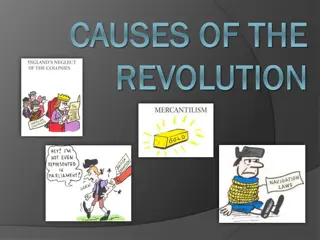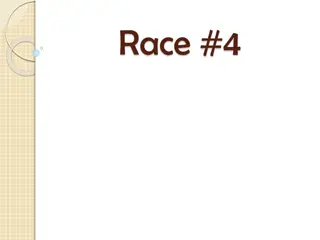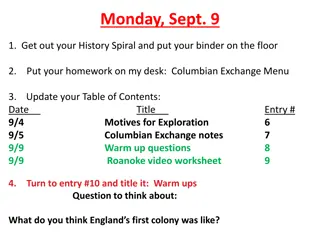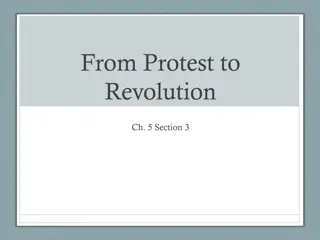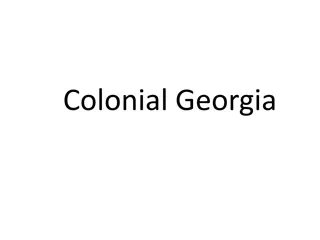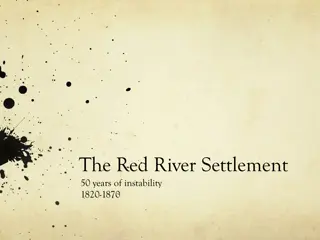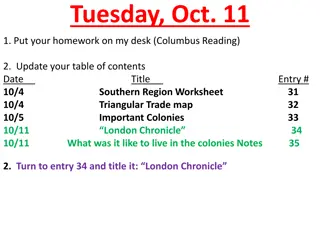Strengths and Weaknesses in the Revolutionary War
The Revolutionary War between the British and Colonies showcased distinct strengths and weaknesses on both sides. The British struggled with unconventional warfare tactics and failed to win over the hearts of the colonists, while the Patriots benefited from strong leadership, support systems, and ci
0 views • 9 slides
Understanding the Declaration of Independence and Colonial Perspectives
Explore the significance of the Declaration of Independence written by Thomas Jefferson and the differing perspectives of historians on the motivation behind the American Revolution. Learn about the ideological origins and beliefs of the colonists, their fears of tyranny under British rule, and the
7 views • 19 slides
Unveiling the French and Indian War
Trouble arose as Native Americans contested British control, leading to the Proclamation of 1763 restricting colonial settlement. Resentment grew, fueling Pontiac's Rebellion where various tribes, led by Pontiac, fought British forces. Native American warriors attacked forts and colonists, capturing
0 views • 17 slides
Latin American Revolutions: Causes, Events, and Impact
Latin American Revolutions from 1791 to 1825 marked a period of significant upheaval as colonies in the Western Hemisphere sought independence from Spanish rule. Driven by factors like inspired by other successful revolutions, Spanish mercantilist policies, and unequal wealth distribution, these rev
1 views • 12 slides
Events Leading to the American Revolution
Content covers key events such as the French and Indian War, British imperial policies like the Stamp Act, colonists' resistance slogans, activities of groups like the Sons of Liberty, and pivotal moments like the Boston Tea Party. It also delves into the writing of the Declaration of Independence,
0 views • 26 slides
American History Flash Cards
This collection of American History flash cards covers topics such as why the colonists fought the British, who wrote the Declaration of Independence, and who authored the Federalist Papers. It also encourages students to study, take notes, ask questions, and review with a friend. Engage with these
1 views • 8 slides
Colonial Culture and The Great Awakening: Overview and Impact
This content covers activities and notes related to Colonial Culture, Native Americans, Colonists, and the African American community. It also delves into the Great Awakening and Enlightenment period, discussing the religious movement in the 1730s-1740s. Traveling ministers, such as Jonathan Edwards
0 views • 13 slides
Key Events Leading to the American Revolution
In preparation for an upcoming test, students are reminded to set a goal of achieving 70% or higher. They are provided with a handout to study key events such as the French and Indian War, Proclamation of 1763, Sugar Act, Stamp Act, and Quartering Act. The handout includes summaries of each event an
0 views • 13 slides
Early English Settlements in North America: A Historical Overview
The early 1600s marked the influx of European immigrants to North America, laying the foundation for a new civilization. Despite hardships during the journey and economic difficulties in England, colonists sought political freedom, religious liberty, and better opportunities in the New World. Friend
0 views • 11 slides
Declaration of Independence Scavenger Hunt and Discussion
Explore clues and discussions surrounding the Declaration of Independence in this engaging scavenger hunt. Discover insights into the authors' identities, the document's intended audience, grievances, and evidence supporting independence. Delve into a thought-provoking discussion on the justificatio
0 views • 8 slides
The American Revolution: Pursuit of Independence
The American Revolutionary War of 1776-1783 marked a significant turning point in history as colonists sought independence from British rule. The support for independence was fueled by figures like Thomas Paine and pivotal documents such as the Declaration of Independence. The divide among colonists
0 views • 20 slides
Exploring American Colonial History Through Images
Explore the early American colonial period and independence through a collection of visual resources depicting key events such as Christopher Columbus's exploration, the first colonies in Jamestown, interactions between colonists and Native Americans, Thanksgiving celebrations, and political develop
0 views • 36 slides
Revolutionary Era Jeopardy: French & Indian War, Tensions, and Colonist Reactions
Explore the pivotal events of the Revolutionary Era through a Jeopardy game format, covering topics such as the French & Indian War, colonial tensions with Britain, and the reactions of the colonists leading to the Revolutionary War. Test your knowledge on key milestones and historical facts that sh
0 views • 28 slides
Understanding the Proclamation Line of 1763 and Its Impact
Explore the significance of the Proclamation Line of 1763, its context, reaction, and effects on British colonists. Learn about the conflicts with Native Americans, the end of Salutary Neglect, and the reasons behind the proclamation. This document led to anger, disobedience, and distrust among the
0 views • 6 slides
Causes of Colonists' Rebellion: British Tax Policies
British taxation policies, including the Tea Act of 1773, outraged American colonists by imposing taxes without representation, leading to events like the Boston Tea Party. This anger fueled protests against the Intolerable Acts and ultimately escalated tensions towards rebellion.
0 views • 22 slides
The Colonists' Struggle for Rights and Unity: A Timeline
Colonists in the American colonies resisted British control and policies that they saw as violations of their rights, leading to organized opposition and boycotts. Events such as the Townshend Acts, the Boston Massacre, and the Tea Act of 1773 fueled tensions, prompting figures like Samuel Adams to
0 views • 10 slides
Challenges of Empire: From Proclamation to Rebellion
During the period of 1763-1776, the British Empire faced challenges in America resulting from increased taxes, acts restricting colonial autonomy, and resistance from colonists. This led to a series of events including the Currency Act, Sugar Act, Stamp Act, and Townshend Acts, triggering protests,
0 views • 11 slides
Growing Colonial Resistance and Tensions in America
Colonial resistance in America escalated with the Townshend Acts, protests, the Boston Massacre, the Tea Act, and the formation of Committees of Correspondence. Tensions between the colonists and British authorities further intensified as acts of rebellion and British responses fueled the flames of
0 views • 7 slides
Unrest in Colonial America: The Boston Massacre, Tea Party, and Growing Tensions
Discontent brewed in Colonial America as the Boston Massacre, Tea Party, and clashes with British troops fueled anger among colonists. The escalation led to boycotts, propaganda, and resentment towards Britain, culminating in the Tea Act and colonies' defiance.
0 views • 12 slides
The Crisis Begins: Impact of the Stamp Act and Colonial Resistance
The Crisis Begins Chapter from "Give Me Liberty!" discusses the repercussions of the 7 Years War and the end of salutary neglect, leading to new trade regulations and increased taxation on colonists. The imposition of the Stamp Act without colonial consent sparked widespread resistance, with the eme
0 views • 14 slides
The Road to Revolution: Beginning Causes and Impact of Mercantilism
The road to the American Revolution started with the colonists feeling a sense of independence from Britain and being impacted by mercantilism. Mercantilism led to restrictions on trade, enforcement of Navigation Laws, and economic hardships for the colonies, but also provided some benefits such as
0 views • 26 slides
Analyzing Bias and Propaganda in Boston Tea Party History
Explore the Boston Tea Party through language and imagery, learning to examine information from multiple perspectives and detect bias and propaganda. Engage with visual materials, such as political cartoons, and texts like the 1773 Massachusetts Gazette article to determine if they were created by p
0 views • 10 slides
Georgia's Trustee Period: Role of Salzburgers, Highland Scots, Malcontents, and Spanish Threat
German Salzburgers and Scottish Highlanders played crucial roles in Georgia's Trustee Period, settling in areas like Ebenezer and Darien, respectively. However, challenges such as poor land, restrictive regulations, and economic hardships plagued the colonists. The Spanish threat from Florida also l
0 views • 9 slides
The Mystery of the Lost Colony of Roanoke
The Lost Colony of Roanoke refers to a settlement established in 1587 on Roanoke Island, off the coast of what is now North Carolina, which disappeared without a trace. It was England's second colony in America, but the lack of productivity and support led to its abandonment. Despite several attempt
0 views • 11 slides
Understanding Colonial Acts and Proclamations in Early America
Explore the series of acts and proclamations that shaped the relationship between colonists and the British Empire in early America. Learn about significant events such as the Proclamation of 1763, Navigation Acts, Sugar Act, Quartering Act, and Stamp Act, and understand why these measures sparked a
0 views • 18 slides
Colonial Rebellions and Reactions in Early America
The Colonial Rebellions in early America, such as Bacon's Rebellion and the Stono Rebellion, exemplified the growing tensions and conflicts within the colonial society. These uprisings highlighted issues of class struggle, disparity in social status, and led to significant consequences such as the f
0 views • 7 slides
The Road to Revolution: Actions of Parliament and Continental Congress
The events leading to the American Revolution, including the actions of Parliament and the Continental Congress, are highlighted in this chapter. It covers the issues facing the 2nd Continental Congress, the differences between Patriots and Loyalists, the failure of the Olive Branch Petition, and th
0 views • 21 slides
The Founding of Savannah: Oglethorpe, Tomochichi, and Mary Musgrove
On October 6th, 2016, James Oglethorpe, Chief Tomochichi of the Yamacraw tribe, and Mary Musgrove played crucial roles in the establishment of Savannah, Georgia. Oglethorpe, an Englishman, founded the colony and convinced King George II to grant a charter for colonization. Tomochichi, a Yamacraw chi
0 views • 20 slides
King Philip's War: A Comprehensive Review for APUSH Success
Explore the key concepts, events, and impacts of King Philip's War, also known as Metacom's War, a significant conflict between colonists and Native Americans in New England. Understand the causes, course of the war, effects on both sides, and its lasting significance in shaping European/colonial re
0 views • 9 slides
The Stirring Resistance: Colonial Opposition to British Rule in America
The French and Indian War and subsequent taxes imposed by Britain on the American colonies sparked widespread opposition among colonists. From the Stamp Act of 1765 to the Townshend Act of 1767, protests, boycotts, and calls for unity against British rule grew. Despite efforts to maintain order, ten
0 views • 13 slides
Root Causes of the American Revolution: England's Actions and Colonists' Reactions
England's strained relationship with the American colonies intensified due to policies like the Proclamation of 1763, tax laws, trade regulations, the Sugar Act, and the Stamp Act. Colonists resisted through petitions, boycotts, and protests, leading to growing tensions that ultimately sparked the A
0 views • 13 slides
Key Figures and Events of the American Revolution
The content provides information about the disagreements between the colonists and British Parliament concerning governance and taxation, highlighting key figures like George Washington, Thomas Jefferson, Patrick Henry, and James Lafayette who played significant roles in the fight for independence.
0 views • 69 slides
English Colonization: The Story of Roanoke
While England's first colony, Roanoke, faced challenges and mysteries, it set the stage for future English colonization efforts. The colonists, led by John White, settled in present-day North Carolina in 1585. Despite being helped by the Croatoan Indians, the colony ultimately failed. Virginia Dare,
0 views • 15 slides
From Protest to Revolution: The Spark of American Independence
The chapter details the brewing tensions between the American colonists and British authorities leading up to the American Revolution. It covers the Tea Act, the Boston Tea Party, the Intolerable Acts imposed by Parliament, the support from other colonies, and the events at Lexington and Concord tha
0 views • 7 slides
Exploring Colonial Georgia: The Trustee Period and Immigrant Communities
Colonial Georgia was governed by trustees from 1732 until 1753, with strict rules imposed on colonists. Despite this, diverse groups such as Highland Scots, Salzburgers, and Jews immigrated to Georgia, making significant contributions. The Salzburgers, German Protestants seeking religious freedom, s
0 views • 31 slides
The Red River Settlement: 50 Years of Growth and Challenges 1820-1870
The Red River Settlement experienced 50 years of instability from 1820 to 1870, marked by changes in the fur trade, the merger of HBC and NWC, and the development of the Red River Valley community. The settlement evolved into a diverse community of Metis, Scottish colonists, and HBC employees, with
0 views • 22 slides
Life in the Colonies: A Detailed Exploration
Explore what life was truly like in the colonies through a series of tasks involving homework, updating tables of contents, analyzing newspaper articles, and reflecting on various aspects such as farming, city life, rights of colonists, African American experiences, religion, education, colonial fam
0 views • 4 slides

